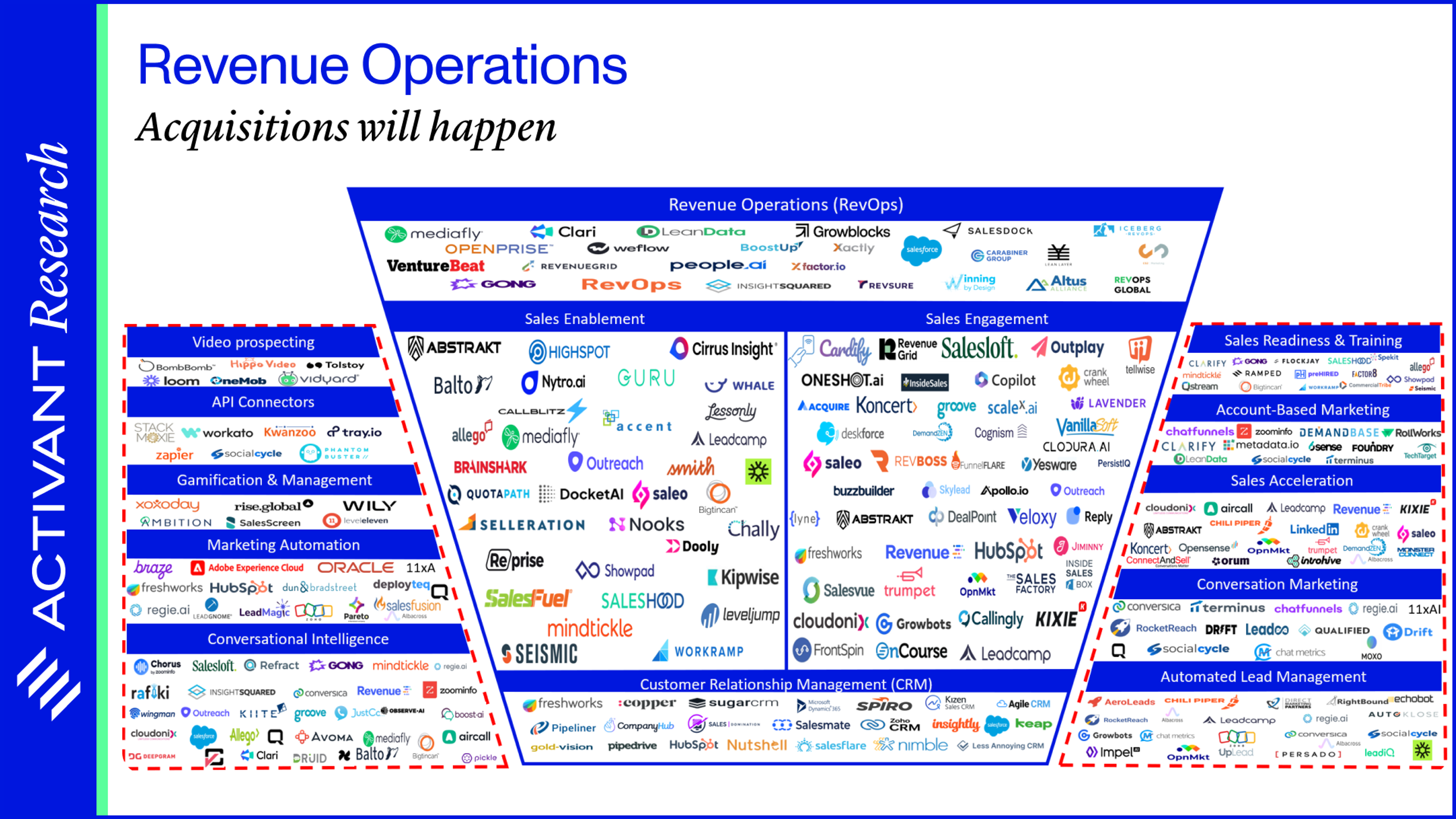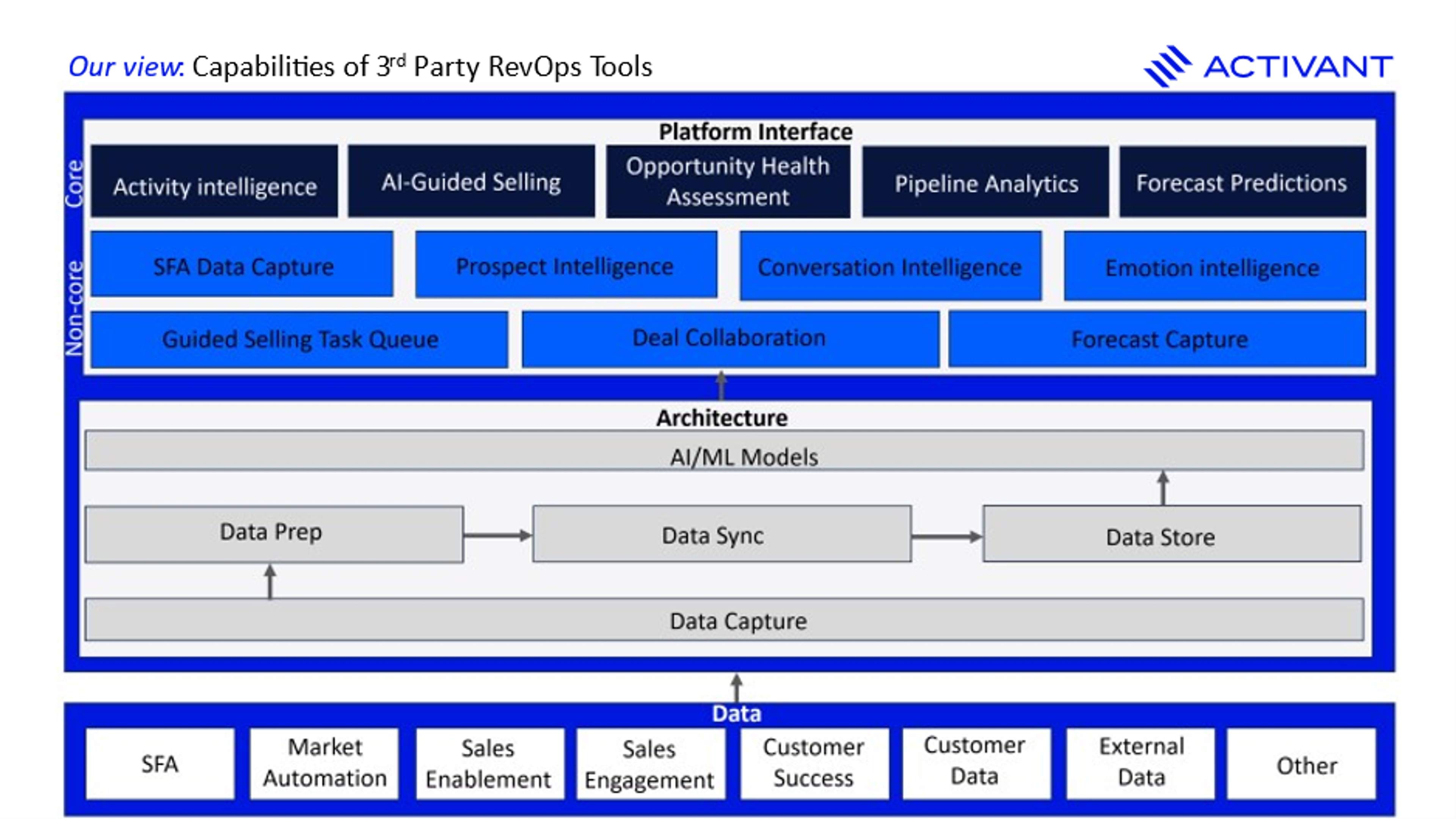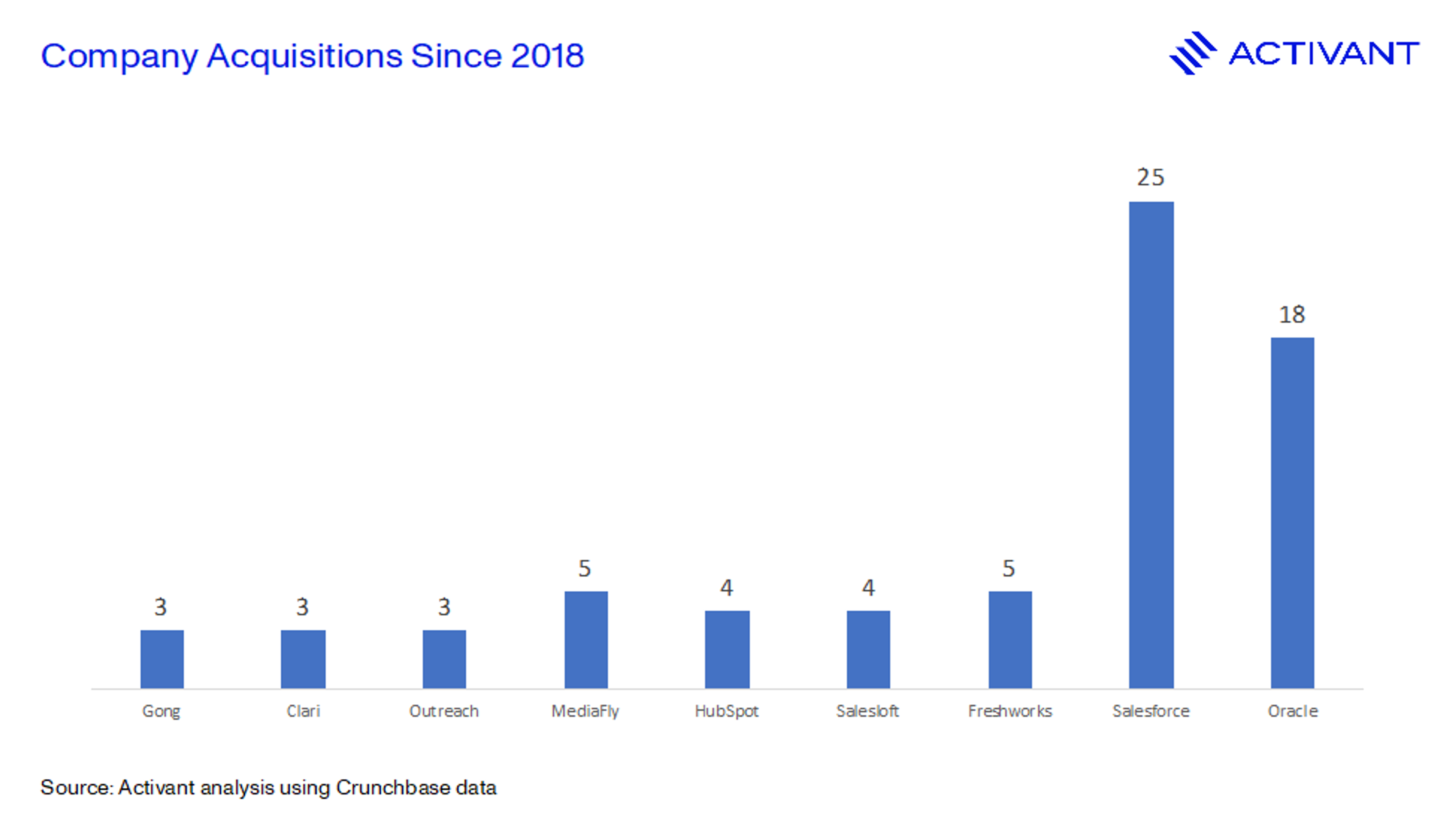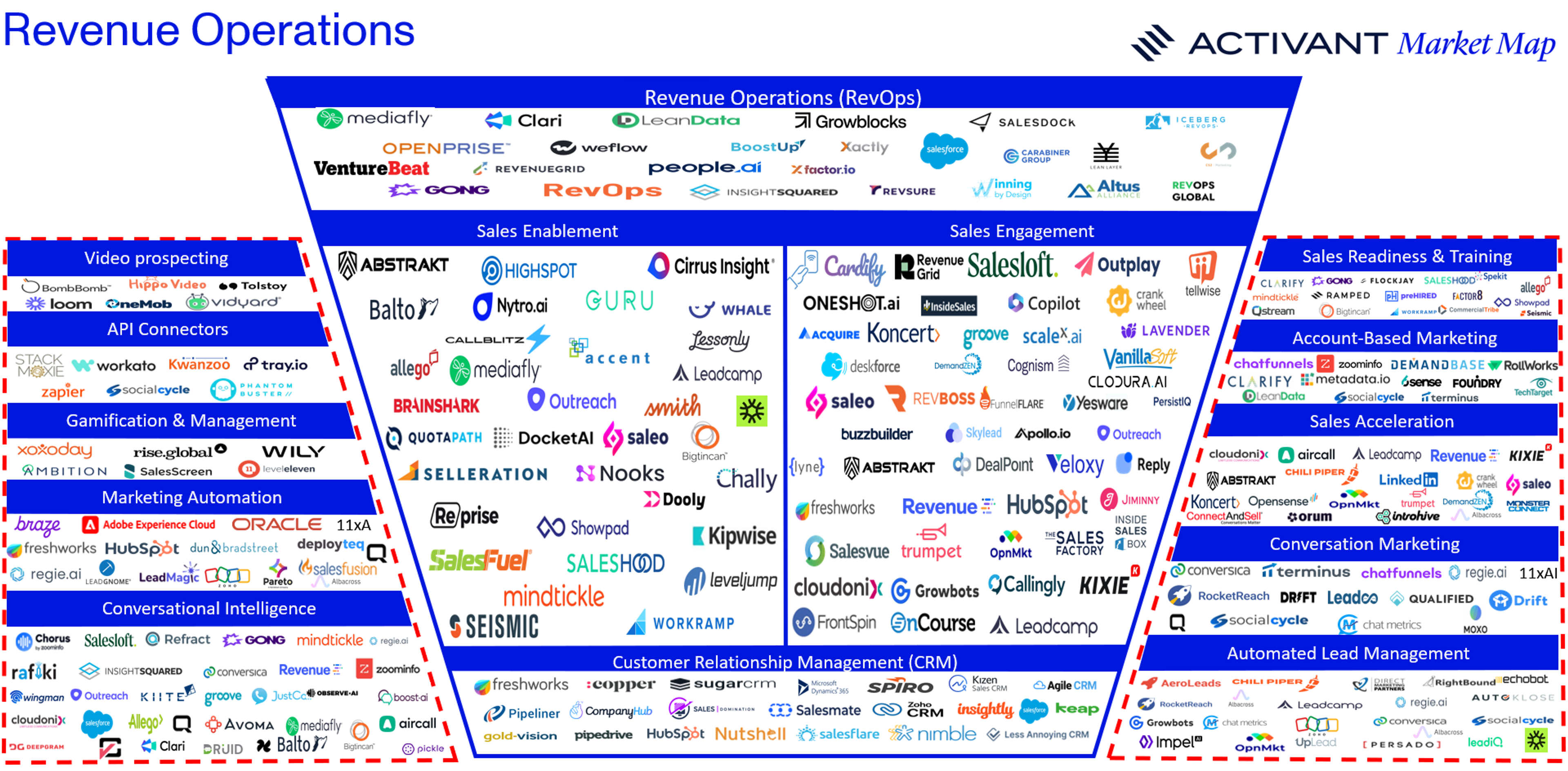Topic
B2B Commerce
Published
September 2024
Reading time
12 minutes
Building RevOps Capabilities
Acquisitions are inevitable
Authors
Aiden Benson-Armer
Intern
Building RevOps Capabilities
Download ArticleResearch

The Revenue Operations (RevOps) function, popularized by Salesforce and HubSpot in the 2000s, gained widespread adoption by the late 2010s as businesses recognized the benefits of a cohesive strategy for managing revenue operations. Initially, RevOps faced skepticism from traditional business leaders who viewed sales, marketing, and customer success as separate functions with distinct goals. Executives were hesitant to invest in a new function without a clear track record, perceiving it as an unproven theory rather than a practical solution. This skepticism was heightened by the challenge of demonstrating immediate value as many benefits of RevOps, such as improved alignment and optimized revenue processes, materialize over time.
However, as early adopters reported substantial improvements in revenue growth, forecasting accuracy, and operational efficiency, perceptions began to shift. The advent of RevOps tools equipped with AI capabilities has revolutionized the function, accelerating the transition of capabilities like prospecting, conversational and emotional intelligence, guided selling, deal collaboration, and forecast capture from near-core to core competencies. Customer demand and expectations for these platform capabilities underscore the sector's competitive nature. This is further evidenced by the active acquisition landscape, where companies are acquiring others to protect strategic positions, expand capabilities, or gain market share, as seen with Salesforce's purchase of Troops.ai and Clari's acquisition of Wingman. These deals highlight the vibrant acquisition market as companies enhance their offerings and capabilities.
An Imperative Rather Than a Choice
In today's rapidly evolving business landscape, implementing RevOps tools is a necessity, not a luxury. Integrating RevOps tools drives growth, improves profitability, and streamlines operations across departments. The urgency to adopt these tools is underscored by recent data, trends, and positive customer feedback on companies such as Regie.ai1,Gong2,3, Apollo.io4, and HubSpot5, highlighting the transformative impact on organizations.

Strong evidence from improved customer feedback metrics, along with third-party research from Gartner6, Forrester7, BCG8, LSA9, and the Harvard Business Review, underscores the critical importance of implementing a revenue operations platform. These sources consistently show that adopting a RevOps approach enhances organizational efficiency, aligns sales, marketing, and customer success teams, and drives revenue growth. Highlights from this research are summarized in the table on the next page.

AI market trends have emphasized the critical need for AI implementation. Activant's article "Road to Virtual Employees" concludes that leveraging RevOps platforms is the most effective approach for scaling AI. This perspective is supported by industry leaders, with Goldman Sachs10 reporting a 3000% increase in AI mentions on Russell 3000 earnings calls since 2010, with significant growth in 2022.

Although implementing RevOps platforms and AI is imperative, companies must navigate several key challenges to successfully integrate these systems into their business processes.
Challenges to Adoption
In calls with industry experts, we identified seven major challenges to adoption that companies typically face:
- Complex Integration: Platforms must seamlessly integrate with existing systems like CRM, email, calendars, and other sales tools. Integration complexity is a significant barrier, especially for companies with entrenched legacy systems or multiple disparate systems. According to MuleSoft’s 2024 Connectivity Benchmark Report11, 95% of leaders cite integration as the top blocker for AI implementation.
- Data Silos and Quality: Many organizations struggle with data that is siloed across different departments. Consolidating this data in a way that is meaningful and useful for a RevOps platform can be challenging. Additionally, data quality issues can undermine the effectiveness of RevOps tools, leading to poor adoption and lack of trust in the system.
- Change Management: Implementing a RevOps platform often requires significant operational and collaborative changes. Staff resistance, especially if benefits are unclear, can hinder adoption. According to McKinsey & Company report on Organizational Transformation12, 70% of change management initiatives fail due to employee resistance and lack of management support.
- Skill Gaps: Platforms require technical and analytical skills that are often lacking in sales or marketing teams. Training and upskilling are necessary to ensure effective use. Salesforce reports that 62% of respondents feel their organizations are ill-equipped to harmonize data systems and leverage AI technologies13.
- Cost and ROI Justification: The cost of implementing a new RevOps platform can be substantial, including software, training, and change management. Companies need a clear path to ROI, which can be difficult to project, especially early on.
- Keeping Pace with Evolving Technologies: The rapid pace of technological change requires RevOps platforms to continually evolve and adopt new tools like AI and machine learning, necessitating ongoing investment. According to Accenture14, 89% of UK executives believe that with rapid tech advancement, innovation with purpose is more critical than ever.
- Vendor Overlap and Redundancy: Companies often have tools covering various sales, marketing, and customer service functions. A new RevOps platform might overlap with these tools, causing redundancy and confusion about which tool to use.
Overcoming obstacles to implementation and adoption typically requires a clear and detailed understanding of the expected benefits and capabilities that new systems will deliver. RevOps is no different.
Critical RevOps Tool Capabilities
As the revenue intelligence market has continued to grow and expand its capabilities, vendors have started to consolidate around a set of core and near-core capabilities. These tools process sales force automation (SFA), market automation, sales engagement, sales enablement, customer success, customer, and external data through AI/ML models. Based on our understanding of the space and the gracious feedback of experts we consulted, we have schematically shown the capabilities of third party RevOps tools, along with the core and near-core capabilities that are common.

Core Capabilities
We believe that the core capabilities of RevOps platforms should include:
- Activity intelligence: Tracks, monitors, and provides insight from other platform such as email, calendars, Zoom, Teams, Slack.
- AI-guided selling: Provides guidance to sellers on what actions to take next, including setting up calls, drafting follow-up messages, providing conversational guidance, and forecasting potential for success.
- Opportunity health assessment: Uses activity information, combined with AI insights on the deal health and potential steps, to improve health as well as determine which deals need more focus and attention than others.
- Pipeline analytics: Provides sales managers with a view of their team’s pipeline through a combination of AI, activity intelligence, and sales history.
- Forecast predictions: Provides AI-driven forecasts and recommendations at multiple stages of the sales cycle.
Near-Core Capabilities
As RevOps vendors continuously seek to differentiate themselves by offering a range of additional features, we expect these near-core capabilities to become entrenched in the market which will shift them to required core capabilities over time.
- SFA data capture: Logs accounts, contacts, and activities in SFA and associates them with an account, contact, lead, and opportunity.
- Prospect intelligence: Provides marketing and sales reps with lead data, AI scoring and guidance on nurturing connections.
- Conversational intelligence: AI analysis of conversations between the buyer and seller, providing active insight to improve interaction quality such as script prompts and guidance as well as insights on the health of the conversations.
- Emotional intelligence: Uses emotional cues from text, audio, or video interactions to provide insight on the health of customer relationships.
- Guided-selling task queue: Provides sales with a list of tasks based off AI analysis of deal signals and health.
- Deal collaboration: Enables deal teams to collaborate as they engage a customer through providing one source of truth that funnels customer interaction into one place for all members to see.
- Forecast capture and audit: Allows managers and leaders to easily submit a bottom-up sales forecast for multiple levels of the sales hierarchy.
As always, companies face the decision to build or buy additional capabilities.
Acquisitions are Inevitable
The intense competition in the RevOps sector has fostered a dynamic acquisition environment. Companies are continually seeking to maintain their market share, enhance their current capabilities, or expand their offerings into near-core areas, thus driving healthy acquisition activity within the industry. Salesforce, for example, acquired Troops.ai in 2022 to enhance their AI-guided selling capabilities, LevelJump in 2021 for opportunity health assessment/sales readiness, and Slack in 2021 for a record $27.7 billion. Similarly, Gong acquired Vayo in 2022 to improve their pipeline analytics, and Xactly acquired TopOpps in 2020 to strengthen their forecast predictions. 6sense acquired Slintel to enhance prospect intelligence, Clari purchased Wingman in 2022 to develop their conversational intelligence tools, Smart Eye acquired Affectiva to expand their emotion intelligence. When it came to deal collaboration, Microsoft decided to acquire Ally.io in 2021.
Using CrunchBase data, we analyzed acquisitions by major RevOps players since 2018. Key CRM companies like Salesforce, Oracle, and Freshworks have consistently acquired smaller RevOps platforms to enhance their offerings. Smaller pure-play RevOps companies such as Salesloft, HubSpot, Gong, Clari, and Mediafly have also made strategic acquisitions to expand their capabilities and stay competitive. This trend underscores the intense competition and ongoing consolidation within the RevOps market, reflecting the sector's dynamic nature as both established and emerging players aggressively enhance their technological capabilities through acquisitions. We expect this activity to continue.

Players to Watch
While each company on our market map is impressive, we are particularly excited about the growth and potential buyouts of the best-in-class players and segments highlighted in red. However, our market map is not exhaustive and does not include all companies in the RevOps and Sales Development space. We acknowledge that many companies span multiple segments and continuously add new features as they grow and expand.

With that said, we are excited about companies represented in Conversational Intelligence/Marketing, Automated Lead Management and Sales Readiness.
Conversational Intelligence
Vendors in this space often start with a narrow focus and then broaden their scope. Gong, a leader in the space, initially focused on conversation intelligence but has since expanded into sales enablement and engagement. Similarly, some vendors are acquired to enhance larger companies' offerings. Groove and Wingman (now Clari Copilot) were acquired by Clari, and Chorus was acquired by ZoomInfo.
Companies we like include:
- Balto: Provides real-time call guidance and conversational analytics. It uses AI to guide sales reps during calls and ensure they follow best practices.
- Salesken: Uses AI to provide real-time assistance and insights during sales calls. It focuses on improving sales conversations and providing actionable intelligence to sales teams.
- Observe.ai: Uses AI to transcribe and analyze sales and support conversations, offering insights and coaching to improve agent performance.
- Deepgram: Uses deep learning to transcribe and analyze voice data, offering tools for building conversational AI applications. It focuses on providing highly accurate speech recognition and analysis.
- Druid: Specializes in creating intelligent virtual assistants designed for various business applications. The Platform supports multiple languages and has customizable virtual assistants.
Automated Lead Management
Vendors specializing in Lead Management are crucial for RevOps platforms, as sales leads are vital for revenue generation. These vendors drive revenue and are prime acquisition targets for larger players. Examples include Salesloft's acquisition of Drift, Gong's acquisition of Vayo, all aimed at enhancing lead generation. These acquisitions help companies protect market position, increase share, or defensively acquire competitors.
Moreover, lead management vendors can expand into new sectors by adding functionalities and offering them to their existing customer base. For instance, Apollo.io, began as a lead management platform and has since expanded into conversational intelligence, coaching, analytics, and sales engagement, becoming an all-in-one platform. To date, Apollo.io has raised over $250 million.
We think the following companies are worth watching:
- LeadIQ: Has added features such as sales prospecting, data management and CRM integration, expanding from its original focus of data collection and enrichment for sales teams.
- Rocketreach: Uses AI to transcribe and analyze sales and support conversations, offering insights and coaching to improve agent performance. Notable customers include Google, Meta, Microsoft, Amazon, Intel, and Disney.
- Echobot: Serving over 300 clients across all industries, Echobot scrapes the data available on the web to generate actionable insights. The company acquired Leadfeader to identify web visitors' data and further expand their lead generation capabilities.
- Growbots: Automates outbound lead generation, helping businesses to find potential customers and set up email campaigns with AI-driven prospecting.
- Albacross: Identifies anonymous website visitors and turns them into sales leads by providing detailed visitor information and integrating with CRM systems.
Sales Readiness
Like automated lead management, sales readiness platforms are essential for equipping sales teams with the knowledge and tools needed to engage effectively with customers, often working alongside lead management at the top of the funnel. The evolution of these platforms from basic training tools to comprehensive AI-driven solutions highlights the importance of continuous learning and real-time support in sales performance. Many all-in-one platforms, such as Gong, Clari, Mediafly, and HubSpot, integrate sales readiness and training as key features, showcasing their role in providing a full suite of capabilities. Successful companies in this space include Allego, and Mindtickle, along with notable acquisitions like Bigtincan acquiring Brainshark, Seismic acquiring Lessonly, and Salesforce acquiring LevelJump.
Interesting players include:
- Saleshood: Sales enablement platform with a focus on training, coaching, and content sharing to improve sales team performance.
- Workramp: Enterprise learning cloud for employee training and customer education at top companies like Reddit, Lattice, Intercom, and Workiva.
- Qstream: Offers a microlearning platform designed to boost sales readiness through scenario-based learning and real-time analytics.
- Spekit: Delivers real-time, in-app training and enablement for sales teams, integrating with tools like Salesforce to provide contextual learning.
Other Interesting Players
As mentioned in our RevOps article, we at Activant are particularly interested in innovative companies like Regie.ai, 11x, Lyzr.ai, Qualified. Please follow the link "Road to Virtual Employees" to learn more about our investment thesis and discover why we are excited about these forward-thinking companies.
Conclusion
While acknowledging the sector's competitive nature and the challenge of differentiating capabilities, we value an environment where acquisitions expand platform capabilities, increase market share, and protect company moats. As AI becomes more entrenched, we expect capabilities to expand, reducing the need for human input. Additionally, we anticipate a rise in acquisitions as interest rates ease and equity markets recover, with companies like Salesforce, HubSpot, and Oracle likely to increase their strategic acquisitions, followed by mid-sized companies.
Endnotes
[1] Regie.ai, Use Cases, 2024
[2] Gong, Virgin Pulse Used Gong to Achieve a 4x Jump in its Top-Of-Funnel Conversions, 2024
[3] Gong, How Gong Helped Mintel Increase Win Rates by 34%, 2024
[4] Apollo.io, Customer Stories, 2024
[5] HubSpot, Case Studies, 2024
[6] Gartner, Market Guide for Revenue Intelligence Platforms, 2021
[7] Forrester, The Total Economic Impact of Clari Revenue Platform, 2022
[8] Boston Consulting Group, Revving Up Go-To-Market Operations in B2B, 2020
[9] LSA, LSA 3x Organizational Alignment Research, 2024
[10] Goldman Sachs, AI investment forecast to approach $200 billion globally by 2025, 2023
[11] Mulesoft: Connectivity Benchmark, 2024
[12] McKinsey: Organizations do not change. People change! ,2019
[13] Salesforce: Connectivity Report, 2024
[14] Accenture: Technology Trends, 2024
The information contained herein is provided for informational purposes only and should not be construed as investment advice. The opinions, views, forecasts, performance, estimates, etc. expressed herein are subject to change without notice. Certain statements contained herein reflect the subjective views and opinions of Activant. Past performance is not indicative of future results. No representation is made that any investment will or is likely to achieve its objectives. All investments involve risk and may result in loss. This newsletter does not constitute an offer to sell or a solicitation of an offer to buy any security. Activant does not provide tax or legal advice and you are encouraged to seek the advice of a tax or legal professional regarding your individual circumstances.
This content may not under any circumstances be relied upon when making a decision to invest in any fund or investment, including those managed by Activant. Certain information contained in here has been obtained from third-party sources, including from portfolio companies of funds managed by Activant. While taken from sources believed to be reliable, Activant has not independently verified such information and makes no representations about the current or enduring accuracy of the information or its appropriateness for a given situation.
Activant does not solicit or make its services available to the public. The content provided herein may include information regarding past and/or present portfolio companies or investments managed by Activant, its affiliates and/or personnel. References to specific companies are for illustrative purposes only and do not necessarily reflect Activant investments. It should not be assumed that investments made in the future will have similar characteristics. Please see “full list of investments” at https://activantcapital.com/companies/ for a full list of investments. Any portfolio companies discussed herein should not be assumed to have been profitable. Certain information herein constitutes “forward-looking statements.” All forward-looking statements represent only the intent and belief of Activant as of the date such statements were made. None of Activant or any of its affiliates (i) assumes any responsibility for the accuracy and completeness of any forward-looking statements or (ii) undertakes any obligation to disseminate any updates or revisions to any forward-looking statement contained herein to reflect any change in their expectation with regard thereto or any change in events, conditions or circumstances on which any such statement is based. Due to various risks and uncertainties, actual events or results may differ materially from those reflected or contemplated in such forward-looking statements.






